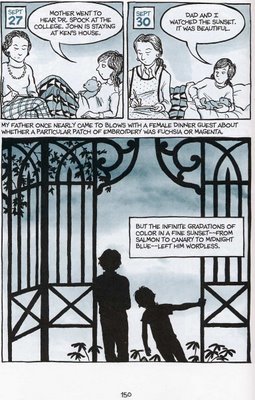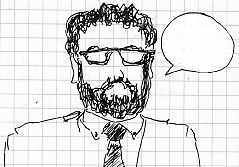Thursday, June 22, 2006
Alison Bechdel, II
Alison Bechdel's Fun Home, (Houghton Mifflin, 2006) has certainly caused a well-deserved stir. (There are links to recently-appearing reviews available at Bechdel's blog.)
There are several things that make Fun Home notable:
(1) It's being (widely) discussed as a "graphic novel," but like Marjane Satrapi's Persepolis, David B.'s Epileptic, and Miriam Katin's We Are On Our Own, it's actually a graphic memoir. Widespread discussion of these sometimes confining and problematic categories, and how and why they exist, is a good thing. (For example, the other night I got into a discussion with someone I had just met about why Fun Home and the Katin memoir were being shelved with graphic novels in the Barnes and Noble.)
(2) For a graphic work, Bechdel's book is immensely literary. Allusions to a wide body of written texts are woven into the book, and, consequently, Fun Home provides a multi-layered, engaging, and rich reading experience.
(3) It's marvelously good.
Bechdel provides the reader with a non-linear exploration of the experiences, memories, and retrospective moments of reflection and self-discovery which forged her development into the artist capable of making the text in your hands. (Joyce's A Portrait of the Artist is a touchstone.) And while I suppose all memoirs do this, the sensation of recognizing this was especially acute for me as I read Fun Home.
Here's my favorite page in the book, which brings chapter five to a close. (For various reasons, young Alison is dictating her diary entries to her mother.)

Alison Bechdel will be speaking at 7PM tonight at the Free Public Library this evening in Philadelphia. (1901 Vine Street)
There are several things that make Fun Home notable:
(1) It's being (widely) discussed as a "graphic novel," but like Marjane Satrapi's Persepolis, David B.'s Epileptic, and Miriam Katin's We Are On Our Own, it's actually a graphic memoir. Widespread discussion of these sometimes confining and problematic categories, and how and why they exist, is a good thing. (For example, the other night I got into a discussion with someone I had just met about why Fun Home and the Katin memoir were being shelved with graphic novels in the Barnes and Noble.)
(2) For a graphic work, Bechdel's book is immensely literary. Allusions to a wide body of written texts are woven into the book, and, consequently, Fun Home provides a multi-layered, engaging, and rich reading experience.
(3) It's marvelously good.
Bechdel provides the reader with a non-linear exploration of the experiences, memories, and retrospective moments of reflection and self-discovery which forged her development into the artist capable of making the text in your hands. (Joyce's A Portrait of the Artist is a touchstone.) And while I suppose all memoirs do this, the sensation of recognizing this was especially acute for me as I read Fun Home.
Here's my favorite page in the book, which brings chapter five to a close. (For various reasons, young Alison is dictating her diary entries to her mother.)

Alison Bechdel will be speaking at 7PM tonight at the Free Public Library this evening in Philadelphia. (1901 Vine Street)
